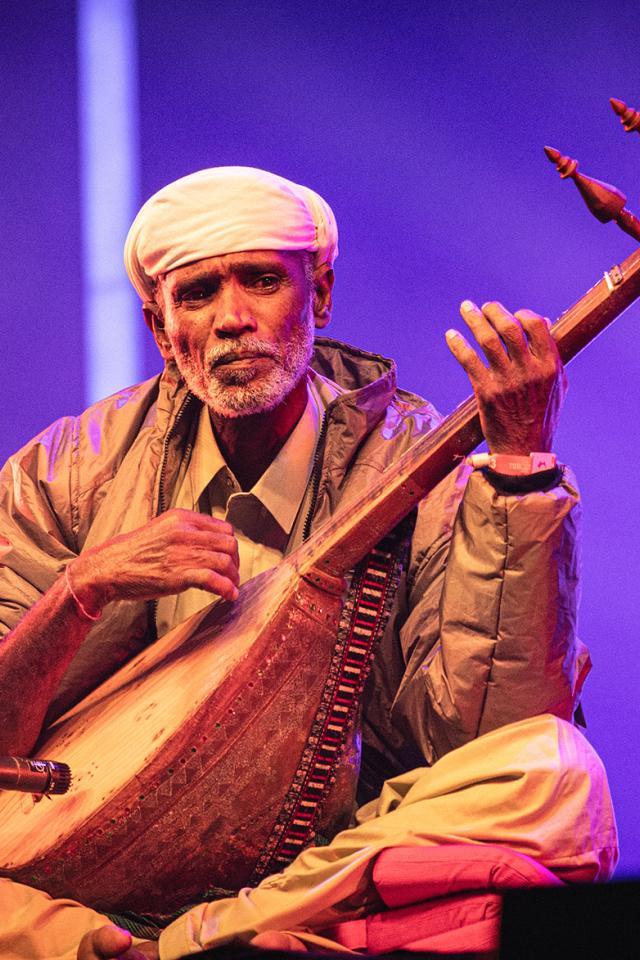Ustad Noor Bakhsh hails from Balochi, a province of Pakistan, and plays the traditional zither-like benju. A hidden virtuoso, Ustad’s playing exudes a spiritual joy and energy that has been captivating audiences the world over. He's been in very high demand these last couple of years after features on Boileroom, The Guardian and appearances at Le Guess Who, Womex and a residency at Cafe Oto.
Nasanjargal Ganbold, aka 'Nasaa', is a master in the field. Hailing from the Altai, the cradle of khöömii (throat singing) in Mongolia. Accompanied by Johanni Curtet, specialist in throat-singing in the West, their music is an arresting interaction with the natural landscape that celebrates nomadic connection with nature. It evokes the ancient.
Please note: There is no support act. The main performance will consist of 2 individual 45 minute sets plus some combined pieces.
Ustad Noor Bakhsh
Ustad Noor Bakhsh, from near Pasni, Balochistan, is a maestro of the Balochi Benju (a keyed Zither), which he has played since he was a child. Noor Bakhsh is well known as a legendary instrumentalist throughout the Makran Coast, but only garnered wider attention after his most recent recordings and videos. The Benju, was once a Japanese children’s toy called the taishōkoto before it was adopted by Balochi musicians and made into the refined folk instrument that it is today. Noor Bakhsh plays an electric Benju, getting his sound through an old pickup and small Phillips amp he bought from Karachi 2 decades ago. He carries forward the legacy of his teachers and inspirations such as Bilawal Belgium and Misri Khan Jamali but his own music elicits influences from various traditions and musical forms far beyond Balochistan. His virtuosic playing is deeply rooted in Balochi musical forms and enriched by his knowledge of South Asian Raags, which he also renders in his own, experimental style.
Nasanjargal Ganbold
Nasaa was born in Khovd province, western Mongolia. He comes from a family of musicians and traditional music has always played an important role in his life. He studied at the Ulaanbaatar Conservatory from 1994 to 2002 and graduated as a musician and music teacher. Nasaa is a talented multi-instrumentalist, and excels in various khöömii/throat singing techniques. In 2001, he joined the music group Börte and performed regularly in Germany and on various international tours. In 2005 he founded Hosoo-Transmongolia with his fellow musicians, and in 2009 the band Sedaa - an ensemble composed of Mongolian and Iranian artists. As a guest he played with Rüdiger Oppermann, the band Estampie and Marco Polo Project in Germany and beyond. Nasaa has worked with various musicians and ensembles in the studio and has produced and released several albums with his own bands. In 2023, he co-founded Tengerton, a quartet of super soloists from Egschiglen, Sedaa, Argusan and Khukh Mongol. He also performs in a duo with Mongolian folk singer Sara Teamusician.
Johanni Curtet
Johanni is a composer, musician, ethnomusicologist, throat-singing teacher and producer. First trained by Trân Quang Hai, his traditional apprenticeship comes from D. Tserendavaa in the steppes of the Altai, and B. Odsüren at the University of Arts and Culture in Ulaanbaatar. He teaches khöömii for the Philharmonie de Paris, and opened the first curriculum in the West in 2020 with the International Institute of World Music in Aubagne. Apart his main trio Meïkhâneh, he has notably played with Tserendavaa, Tsogtgerel, on Orbi by Pierrick Lefranc, the Electric Opera Èves futures by Alain Basso, Ensemble 9 by Pierre Redon, and also Katajjaq and Khöömii, Chorus Nunavik / Mongolia by Katia Makdissi-Warren for the First Peoples Festival in Montreal. He is also Artistic Director and founder of the Routes Nomades association since 2006, he produces Mongolian throat-singing tours and records internationally.
